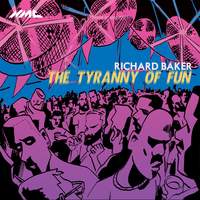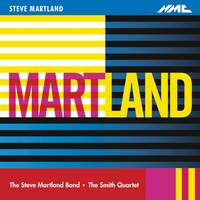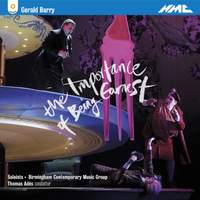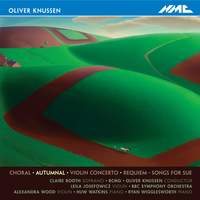Interview,
Richard Baker on The Tyranny of Fun

As trailblazing British contemporary label NMC moves into its 35th anniversary year, the first album out of the starting blocks is The Tyranny of Fun, a collection of works from the last three decades from Richard Baker, reflecting in particular his long and fruitful association with the Birmingham Contemporary Music Group.
The title track responds to a chance comment by theatre director Richard Eyre, describing the mandatory fun organised by his parents as both tyrannical and a desperate distraction from an internal emptiness. It's also a modern spin on Ravel's La Valse - distilling the essence not of the waltz but of the disco scene of the '70s and '80s.
Other works on the album represent Baker's musical reactions to the tumultuous events of 2020, to the changing tides of secularism in Ireland, and (nearer to home) to the retirement of two lynchpin figures of the BCMG in the 2010s.
I spoke to Richard to find out more about the works on this album.
You’ve been working with the Birmingham Contemporary Music Group for much of your career; how did that relationship first come about, and how has it evolved over the years?
I was the assistant conductor on Gerald Barry’s The Triumph of Beauty and Deceit for Aldeburgh/Almeida Opera in 2004, and conducted one of the performances. In retrospect, it was a bit of a baptism of fire, but the ensemble responded positively, and I was invited back to do some other things – first assisting Sakari Oramo and Oliver Knussen, later doing some concerts in my own right. At that time, the ensemble didn’t really know me as a composer, but that changed with Hommagesquisse in 2008, which I wrote for Boulez’s visit to Birmingham to receive an Honorary Doctorate from the Conservatoire. They’ve been so incredibly loyal and supportive of me, commissioning several pieces, allowing me to experiment, and truly helped me become a better musician. I suppose the fact that I’m a local lad – I was born in Dudley – makes the connection all the more meaningful.
It’s such an incredible tragedy what’s happening in Birmingham, the defunding of culture by the City Council. It just makes me think of Alexei Sayle’s brilliant observation that “Austerity is the idea that the global financial crash of 2008 was caused by there being too many libraries in Wolverhampton.” The last fifteen years has seen a massive transfer of wealth from the state to a relatively small number of individuals, and now to add insult to injury, we’re being told there is no money for the things that make life worth living. It is nonsense, and it’s everyone’s duty to resist. We have enough — we just seem to have abandoned the consensus that government has a responsibility to deliver a just society that gives life meaning for everyone. These are political choices, and we must hold politicians to account for them, and not devolve into finger pointing about which cultural forms are ‘too expensive’ or ‘too elitist’, which is a distraction from the real problem.
The one thing classical music almost always lacks - which draws some people to it and puts others off - is the regular thudding beat that recurs at various points in the disco-inspired Tyranny of Fun. How did the BCMG audiences react to this funky, pulsing kind of sound?
My first proper composition teacher was Steve Martland, whose music is full of regular pulse, and pulse is incredibly important in my music, albeit often warped and distorted in various ways. Although The Tyranny of Fun often has a thudding disco beat, it’s perhaps best to think of its relationship to club music in the light of Diaghilev’s observation to Ravel, when he first played La Valse to him (“It’s not a ballet. It’s a portrait of a ballet”). Similarly, my piece isn’t disco, and it’s not trying to be – it’s about dancing — and other things — in and around those spaces. The piece had a terrific first performance, and I think the audience enjoyed it, although it is a strange piece and it elicited some strong reactions from colleagues. There is a commonly held view that one can’t use that kind of kick drum sound in ‘classical’ ensembles – that it’s naff or embarrassing – and one of the challenges I set myself was to write a piece where it made sense.
How much does the ‘backstory’ to Motet II matter to the listener? Would you prefer them to know more, or less, or nothing at all, about the moment in time and the combination of news events that gave rise to it?
So this is the right question to ask, because one of the things I’m exploring in this series of Motet pieces is the very idea of ‘content’ in instrumental music. We have inherited a very narrow – and quite Romantic – view of this, very much conditioned by programme music and film music — and I’ve made use of this inheritance in pieces like Learning to Fly, also on the disc. But the way in which music might have content was very different to the mediaeval mind: often it was buried; not so much about the way the surface of the music sounded, but to be teased out from the overlaying of different layers of music with different but related texts; not necessarily something that could be apprehended in real time. It wouldn’t be accurate to say that this piece is ‘about’ any one thing – it’s made from the collision of several things that were whirling about my head at one point in time – Autumn 2020 — and which I brought into a relationship in the music. A composer friend heard the piece and said it was like being told a secret, and I loved that. I would like the listener to have the sense of something being communicated, but that something is opaque and mysterious.
In Motet II, one of the things you draw on is the transcription of speech into music, which reminded me of coming across the same thing in Steve Reich’s Different Trains. Was that work an influence on yours?
Of course – it’s one of the great pieces made from speech-melodies. But I suppose for me, a bigger influence is Janaček, who made use of speech-melodies from his native Czech in his operas and instrumental music. His string quartets in particular have been a huge influence on me.
A couple of these pieces have a certain Welsh connection - Motet II and, perhaps more overtly, Hwyl fawr ffrindiau. Is this just a coincidence that I’m reading too much into, or do you have a particular affinity for Wales?
It’s interesting – one of my earliest childhood memories is of a school trip to Aberystwyth on the train from Wolverhampton. I came to stay in rural Ceredigion in 2012, whilst I was composing The Tyranny of Fun. I’d been living in Berlin for three years, and enjoyed the city a lot, but it came to a natural end. I suppose I was looking for a complete change – I’d lived my teenage years in a quite isolated rural setting on the Staffordshire/Shropshire border, and that isolation had been very helpful in lots of ways. Then I met my partner – a Welsh theatre critic and academic – and stayed. Welsh is his first language, and the first language of most of our neighbours. The Welsh language is truly one of the jewels of these islands, and I find it a little sad how uncurious many English people are about it.
You candidly mention having come across the text of To Keep a True Lent ‘while looking for something else’ - is that unusual, or does serendipity play a big part in how your music develops?
It is central to my process. Often, one comes across things – text, visual artworks, news stories – that seem to have a kind of radioactivity, or that seem to be vibrating at a certain frequency, that signals that there is something there, but you don’t know in that moment what to do with them. I will squirrel them away, in notebooks, on my computer or just in my memory, and wait until I can see how they connect to musical material – my own or other people’s. This can take years, actually – both Learning to Fly and The Tyranny of Fun had a long gestation, whilst I worked out the implications of their initial ideas. Motet II was quicker, more urgent perhaps, but still a collision of several things I’d collected, which initially I didn’t quite know what to do with. A lovely video clip of Eartha Kitt singing a Welsh folksong on an 1980s television chat show led me to read about Kitt’s blacklisting in the US for protesting against the Vietnam draft at a White House luncheon – the reason why she was forced to make her career in Europe later. But these things didn’t come into focus for me until the 2020 Black Lives Matter protests – and vigorous debates online and in real life – against structural racism, which had a distinctive manifestation in Wales and Welsh media because of the way they intersected and were sometimes in tension with the politics of the Welsh language.
Despite composing plenty of pieces for various forces, it wasn’t until 2019 that your first orchestral piece (The Price of Curiosity) came along. Was this a conscious decision to explore other genres first, or were there more practical considerations?
The important factor here is my early study with Steve Martland and his former teacher Louis Andriessen, both of whom had eschewed the institution of the symphony orchestra for political reasons. So I didn’t write for orchestra as a student, and by the time I was working professionally had missed the boat, somewhat. But also – and true to my usual way of working – I hadn’t really had an idea that I felt needed those forces to realise it. The Price of Curiosity – which is essentially the first of the Motet pieces – is densely layered with transcriptions of speech and song, and for the first time in my life, I really needed triple wind and multiple desks of strings to play all the notes. It was a wonderful experience hearing it, having left writing for orchestra until I really knew what I needed it for. I was very pleased with the noise it made, which probably sounds like a strange thing for a composer to say, but a lot of the orchestration was quite speculative. I loved the way it felt almost three dimensional in the hall. I can’t wait to write another one, now.
Richard Baker, CHROMA, Birmingham Contemporary Music Group (chamber ensemble), Finnegan Downie Dear, Three Strange Angels, Sir Stephen Cleobury
Choir of King's College Cambridge
Available Formats: CD, MP3, FLAC
The Steve Martland Band
Available Formats: 2 CDs, MP3, FLAC
Barbara Hannigan (Cecily), Peter Tantsits (Jack Worthing), Joshua Bloom (Algernon), Katalin Károlyi (Gwendoline), Hilary Summers (Miss Prism), Alan Ewing (Lady Bracknell), Benjamin Bevan (Lane/Merriman), Joshua Hart (Dr Chasuble)
BCMG, Thomas Adès
Available Formats: CD, MP3, FLAC, Hi-Res FLAC
Alexandra Wood (violin), Huw Watkins (piano), Claire Booth (soprano), Ryan Wigglesworth (piano), Leila Josefowicz (violin); BBC Symphony Orchestra, BCMG, Oliver Knussen
Available Formats: CD, MP3, FLAC






